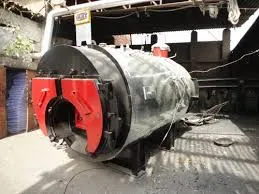
Sep . 16, 2024 15:42 Back to list
hot water boiler pressure
Understanding Hot Water Boiler Pressure Importance and Management
Hot water boilers play a crucial role in heating systems, providing warmth and comfort in residential and commercial buildings. One of the key aspects that ensures the efficient operation of a hot water boiler is maintaining the correct pressure. Understanding the significance of hot water boiler pressure and how to manage it is essential for optimal performance and safety.
What is Boiler Pressure?
Boiler pressure refers to the amount of pressure inside the boiler, measured in pounds per square inch (psi). This pressure is crucial because it affects the system's ability to circulate hot water effectively. Typical residential hot water boilers operate at pressures ranging from 12 to 30 psi. If the pressure is too low, it can result in insufficient heating, while excessively high pressure can lead to dangerous situations, including boiler failure or explosions.
Importance of Maintaining Correct Pressure
Maintaining the correct pressure is vital for several reasons. First and foremost, safety is the primary concern. High pressure can cause stress on the boiler and its components, leading to leaks, corrosion, or even catastrophic failures. Secondly, proper pressure ensures efficient heat transfer within the system. A boiler operating at optimal pressure will heat water more evenly, resulting in consistent warmth throughout the premises.
hot water boiler pressure

Furthermore, keeping the pressure in check helps to reduce energy consumption. An overworked boiler uses more fuel and increases utility bills. Therefore, monitoring and managing boiler pressure not only promotes safety but also enhances energy efficiency.
Monitoring Boiler Pressure
To maintain the correct boiler pressure, regular monitoring is essential. Most modern boilers come equipped with pressure gauges that display the current pressure level. Homeowners and facility managers should routinely check these gauges to ensure they fall within the recommended range.
In cases where the pressure is too low, it may indicate a leak in the system or insufficient water levels. To remedy this, one can add water through the boiler’s filling loop. However, it’s crucial to follow manufacturer guidelines and not exceed the maximum pressure limit. Conversely, high pressure can be a sign of various issues, such as a malfunctioning pressure relief valve or an overfilled system. It’s advisable to consult a qualified technician to address these problems promptly.
Conclusion
In summary, understanding and managing hot water boiler pressure is vital for ensuring safety, efficiency, and longevity of the heating system. Regular monitoring and adjustment of boiler pressure can prevent accidents and costly repairs. Homeowners and facility managers should prioritize these practices and engage professionals for any significant pressure-related concerns. By staying informed about boiler pressure dynamics, one can ensure a comfortable and safe environment, ultimately enhancing the overall reliability of the heating system.
-
Efficient Biomass Fired Hot Water Boiler | AI Heating Solution
NewsAug.01,2025
-
High-Efficiency Gas Thermal Oil Boilers | HPT Models
NewsJul.31,2025
-
Oil Fired Hot Water Boilers Sale - High Efficiency & Affordable
NewsJul.31,2025
-
High-Efficiency Commercial Oil Fired Steam Boiler for Industry
NewsJul.30,2025
-
High-Efficiency Biomass Fired Thermal Oil Boiler Solutions
NewsJul.30,2025
-
High Efficiency Gas Fired Thermal Oil Boiler for Industrial Heating
NewsJul.29,2025
Related PRODUCTS






















